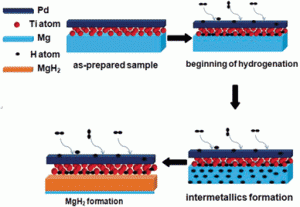As the world’s reserves of fossil fuels are fast diminishing, the need for alternative efficient fuels is increasing. Using hydrogen as an energy carrier is attractive for the future since when hydrogen fuel is used in a fuel cell to generate electricity, the only waste product is water. To realise a hydrogen economy, the barriers that need to be overcome are producing hydrogen more efficiently, hydrogen transport and a suitable means of hydrogen storage.
Finding new methods of storing hydrogen is a thriving area of research. The problem we face is that hydrogen storage at ambient pressure and temperature has been a challenge. Xingguo Li and his team are one of the few groups to investigate Mg-Pd films with a transition metal interlayer for hydrogen storage applications. The team have used a technique called magnetron spluttering which is a surface coating technique to produce Mg-Ti-Pd trilayer films.
Most magnesium-based materials for hydrogen storage that have been studied so far have high operating temperatures and so new systems need to be developed that operate at ambient conditions. Xingguo Li and his group have now shown that this is possible by discovering that the trilayer films could be reversibly (de)hydrogenated at ambient temperature – a great improvement on the kinetics of previous magnesium based systems for hydrogen storage.
To learn more about the role that the titanium interlayer plays in the enhancement of Mg-Pd films for hydrogen storage, read the full Dalton Transactions article:
Superior (de)hydrogenation properties of Mg-Ti-Pd trilayer films at room temperature
Gongbiao Xin, Junzhi Yang, Chongyun Wang, Jie Zheng and Xingguo Li
DOI: 10.1039/C2DT30253E











